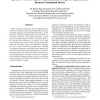Free Online Productivity Tools
i2Speak
i2Symbol
i2OCR
iTex2Img
iWeb2Print
iWeb2Shot
i2Type
iPdf2Split
iPdf2Merge
i2Bopomofo
i2Arabic
i2Style
i2Image
i2PDF
iLatex2Rtf
Sci2ools
AINA
2007
IEEE
2007
IEEE
pKASSO: Towards Seamless Authentication Providing Non-Repudiation on Resource-Constrained Devices
PKI is generally considered as the most appropriate solution for e-commerce and mutual authentication, owing to its digital signature and non-repudiation features. Asymmetric key operations of PKI require by far more CPU cycles than a symmetric cryptographic algorithm. It hampers the usability of PKI on resource-constrained devices. To overcome these limitations, we propose a new PKIbased authentication protocol and security infrastructure enhanced with single sign-on and delegation technology for a device with a restricted computing power. Although a conventional delegation mechanism cannot support nonrepudiation mechanism against malicious user's behavior, our proposed protocol and security infrastructure can provide the mechanism by devising a referee server that generates binding information between a device and authentication messages, and retains the information in its local storage for future accusation.
AINA 2007 | Computer Networks | Conventional Delegation Mechanism | PKIbased Authentication Protocol | Security Infrastructure |
| Added | 15 Aug 2010 |
| Updated | 15 Aug 2010 |
| Type | Conference |
| Year | 2007 |
| Where | AINA |
| Authors | Ki-Woong Park, Hyunchul Seok, Kyu Ho Park |
Comments (0)

